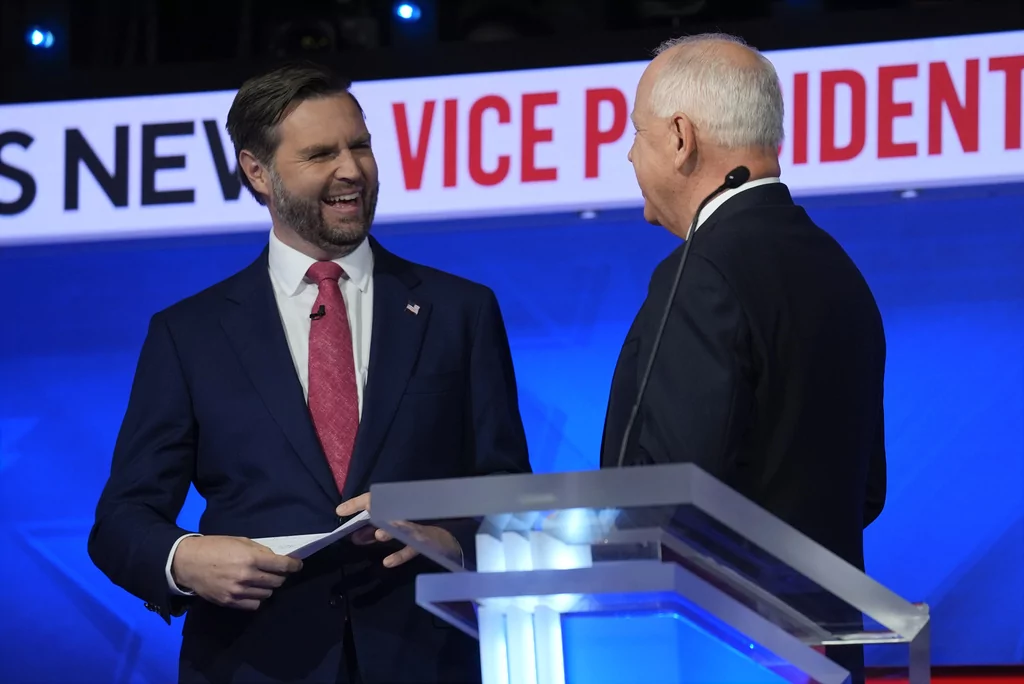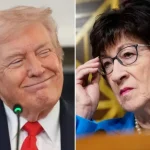

Sen. J.D. Vance (R-OH) dominated the vice presidential debate against Gov. Tim Walz (D-MN) on Tuesday night, most importantly showcasing a softer side in a series of surprisingly civil exchanges.
How voters feel about the candidates after a debate often matters more than who won on debating points. The latter metric clearly favors Vance.
Vance entered the debate confronting a paradox: He has probably been the most effective of the four major-party ticket nominees on the campaign trail, and he has certainly done the most interviews of the bunch, many of them adversarial. But polling also showed Vance to be the least liked.
The preparation paid off for Vance, who was in command most of the night. Walz appeared nervous and stumbled in some answers early, though he picked up steam as he went along. But what Vance offered was a strong defense of former President Donald Trump and his policies in a calm demeanor that might comfort suburbanites and undecided voters.
It was not only a contrast with Trump but with popular perceptions of Vance himself.
Now the question is whether public attitudes about Vance are malleable enough to change at this point in the campaign. It is no surprise that the Hillbilly Elegy author and erstwhile commentator was a capable debater, whereas Walz reportedly warned Democrats he was not the strongest debater during the vice presidential selection process.
But it is some of the comments Vance has made as a polemicist rather than a politician that have caused him the most trouble. The main reason his poll numbers are so low compared to Walz is that Democrats defined him early with his “childless cat ladies” comment. Many women supporting Vice President Kamala Harris’s candidacy have embraced the term as a badge of honor.
Vance displayed little of that harder edge in his CBS News debate with Walz. “I grew up in a working-class family in a neighborhood where I knew a lot of young women who had unplanned pregnancies and decided to terminate those pregnancies because they [felt] like they didn’t have any other options. And, you know, one of them is actually very dear to me,” Vance said. “And I know she’s watching tonight, and I love you. And she told me something a couple years ago that she felt like if she hadn’t had that abortion, that it would have destroyed her life because she was in an abusive relationship.”
“I think that what I take from that, as a Republican who proudly wants to protect innocent life in this country, who proudly wants to protect the vulnerable is that my party, we’ve got to do so much better of a job at earning the American people’s trust back on this issue where they frankly just don’t trust us,” Vance said. “And I think that’s one of the things that Donald Trump and I are endeavoring to do. I want us, as a Republican Party, to be pro-family in the fullest sense of the word.”
The freshman senator sought to show empathy and compassion rather than judgment while still defending abortion policies made possible by the Supreme Court’s reversal of Roe v. Wade.
“I want us to support fertility treatments,” Vance continued. “I want us to make it easier for moms to afford to have babies. I want it to make it easier for young families to afford a home so they can afford a place to raise that family.”
No cat ladies. Instead, Vance said, “So many young women would love to have families.”
Vice presidential debates rarely have a major impact on the presidential race. In 1988, Lloyd Bentsen had one of the most memorable moments in such an encounter when he hit Dan Quayle for comparing his qualifications to John F. Kennedy’s. Quayle and his running mate, George H.W. Bush, went on to win 40 states that November.
At the same time, that debate was part of a series of events that defined Quayle forever as a lightweight and put a ceiling on his national ambitions. Quayle never became president or got especially close to the Republican nomination when he finally ran.
In that sense, the debate was probably more important for Vance than Walz since the latter is not believed to harbor presidential ambitions. Trump is 78 and limited to a single term under the 22nd Amendment. Vance would be a front-runner for the 2028 GOP presidential nomination if Republicans win the White House in November. The Ohioan would also surely like to remain a leading voice in his party if he and Trump lose, as Paul Ryan did after he and Mitt Romney lost in 2012.
A precedent for how superficial impressions can be turned around with greater public exposure can be found in the woman Trump and Vance are trying to beat. Harris has seen her favorability climb by 16 points in NBC News polling from July to September, a spike that has been compared to George W. Bush’s in the aftermath of the 9/11 terrorist attacks.
CLICK HERE TO READ MORE FROM THE WASHINGTON EXAMINER
Vance is never likely to get the fawning media coverage that Harris has received ever since she replaced President Joe Biden at the top of the ticket. But voters can still get to know him better.
It was no surprise that Vance was a disciplined messenger for the Trump campaign and a skilled communicator. Whether he succeeded in humanizing himself to a hostile electorate could play a big role in the Republican future.




